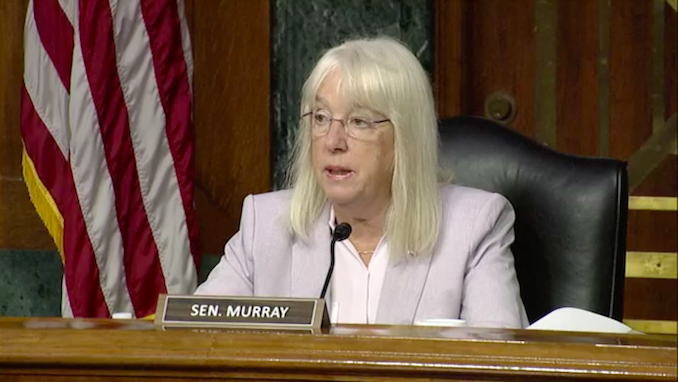
The Senate Committee on Health, Education, Labor and Pensions approved a bill that could provide the first federal requirement of legal counsel to parents and children in child welfare cases, though there appeared to be some discussion of further negotiations on that before a vote of the full Senate.
The Senate’s version of a reauthorization of the Child Abuse Prevention and Treatment Act (CAPTA), which was passed in 1974 and has not been updated since 2010, includes two new requirements related to legal counsel. One mandates that state CAPTA plans ensure “an attorney ad litem to provide legal services” for children involved in dependency court cases, and that the attorney represent “the child’s wishes,” assuming the child is old enough to articulate them.
The other requirement is that states provide assurance that “all parents shall, in all cases involving allegations of child abuse or neglect which results [sic] in a judicial proceeding, have legal representation by a trained attorney for the entire duration of the court’s jurisdiction in the case.”
The addition of the counsel requirement surprised many child welfare advocates, though it does follow some momentum in federal policy around legal supports. During the Trump administration, the rules on the Title IV-E child welfare entitlement were changed to permit states to seek a 50% match on lawyers for parents and children. The availability of federal dollars allows such provisions in CAPTA to avoid the dreaded tag of “unfunded mandate.”
But while the reauthorization bill coasted through its markup in under half an hour, two Senators — Mike Braun (R-Ind.) and Maggie Hassan (D-N.H.) — raised concern about the addition of the legal counsel requirement.
Braun said his state was among 10 that currently do not require an attorney for children in each case, but that Indiana’s practice of using guardians ad litem to represent children in court had worked well. Guardians, who are in many systems trained and managed as volunteers by local affiliates of Court Appointed Special Advocates (CASA), are sometimes attorneys, but are not required to be. And their mandate is almost always to represent the best interests of the child, rather than expressing what the child wants to happen.
“I’m interested in learning more, and not rushing into a federal mandate,” Braun said.
While the two did not formally put forth an amendment to the bill, Hassan somewhat cryptically thanked Committee Chair Patty Murray (D-Wash.) for the chance to “not move forward to a vote in the full Senate until this is resolved.”
There isn’t a formal step between committee approval and the Senate vote, so that would seem to mean that Murray has left open the possibility of softening the language or removing it, and then presenting what’s called an “amendment in the nature of a substitute” when it comes time for a full vote.
The back-and-forth drew a sharp rebuke from the Children’s Advocacy Institute, the national nonprofit most focused on advocating for quality counsel for system-involved children.
The inclusion of counsel requirements “must not be derailed by those prioritizing lay volunteers over the vulnerable children they are supposed to serve,” said Amy Harfeld, national policy director for the institute. “When children land in the ER, they need a doctor; when they land in court, they need a lawyer. Lay volunteers are valuable partners, but not acceptable substitutes in either instance.”
The National CASA/GAL Association for Children declined to comment when asked by Youth Services Insider if it opposes the legal counsel requirements in the bill.
The Senate bill also includes a new title within the Child Abuse Prevention and Treatment Act that would move to tighten up the data collection around child fatalities and near fatalities, and authorize $20 million to help states improve their data collection and fatality review processes.
The House has already passed its version of a CAPTA reauthorization, which does not include the legal counsel requirement. Assuming the Senate bill is passed, the two versions would be reconciled. That offers another point at which the legal counsel requirements could vanish, but Youth Services Insider hears that the House would likely support its inclusion.






